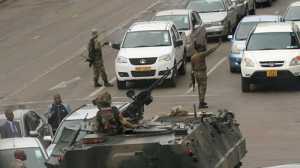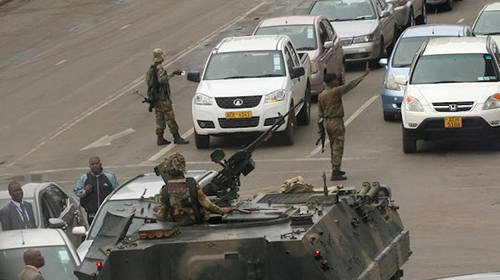Zimbabwe’s army said Wednesday it has President Robert Mugabe and his wife in custody and was securing government offices and patrolling the capital’s streets following a night of unrest that included a military takeover of the state broadcaster.
The night’s action triggered speculation of a coup, but the military’s supporters praised it as a “bloodless correction.” South Africa’s president said he spoke with Mugabe, who was “fine” but confined to his home.
For the first time, this southern African nation is seeing the military oppose the 93-year-old Mugabe, the world’s oldest head of state and one of the longest-serving authoritarian rulers. Mugabe has been in power since Zimbabwe’s independence from white minority rule in 1980.
The whiplash developments followed Mugabe’s firing of his deputy, which had appeared to position the first lady, Grace Mugabe, to replace Emmerson Mnangagwa as one of the country’s two vice presidents at a party conference next month. But the first lady has proved unpopular among some Zimbabweans, and Mnangagwa had significant support from the military.
It was not clear Wednesday where Mnangagwa was, though he fled the country last week citing threats to him and his family.
Armed soldiers in armored personnel carriers stationed themselves at key points in Harare, while Zimbabweans formed long lines at banks in order to draw the limited cash available, a routine chore in the country’s ongoing financial crisis. People looked at their phones to read about the army takeover and others went to work or to shops.
In an address to the nation after taking control of the Zimbabwe Broadcasting Corporation, Major General Sibusiso Moyo said early Wednesday the military is targeting “criminals” around Mugabe, and sought to reassure the country that order will be restored.
Mugabe and his wife appeared to be in the custody of the military. “Their security is guaranteed,” Moyo said.
“We wish to make it abundantly clear that this is not a military takeover,” he said. “We are only targeting criminals around (Mugabe) who are committing crimes that are causing social and economic suffering in the country in order to bring them to justice.”
Moyo added “as soon as we have accomplished our mission, we expect that the situation will return to normalcy.” The army spokesman called on churches to pray for the nation. He urged other security forces to “cooperate for the good of our country,” warning that “any provocation will be met with an appropriate response.”
All troops were ordered to return to barracks immediately, with all leave canceled, said Moyo. The broadcast was sent out from the ZBC headquarters in Pocket’s Hill near Harare’s Borrowdale suburb.
South African President Jacob Zuma said he was sending his ministers of defense and state security to Zimbabwe to meet with Mugabe and the military there. He said he hopes Zimbabwe’s army will respect the constitution and that the situation “is going to be controlled.”
The head of Zimbabwe’s influential war veterans association, once a staunch supporter of Mugabe, said they stand with the army and that Mugabe should be recalled as president and ruling party leader.
Victor Matemadanda told reporters that the ruling party should establish a commission of inquiry into Mugabe and why he decided to let his wife insult veterans and the armed forces.
The military actions appear to put Zimbabwe’s army in control. Army commander Constantino Chiwenga had threatened on Monday to “step in” to calm political tensions. Mugabe’s ruling ZANU-PF party responded by accusing the general of “treasonable conduct.”
The army has been praised by the nation’s war veterans for carrying out “a bloodless correction of gross abuse of power.” The military will return Zimbabwe to “genuine democracy” and make the country a “modern model nation,” said Chris Mutsvangwa, chairman of the war veterans’ association, told The Associated Press in Johannesburg.
The U.S. Embassy closed to the public Wednesday and encouraged citizens to shelter in place, citing “the ongoing political uncertainty through the night.” The British Embassy issued a similar warning, citing “reports of unusual military activity.”
AP






